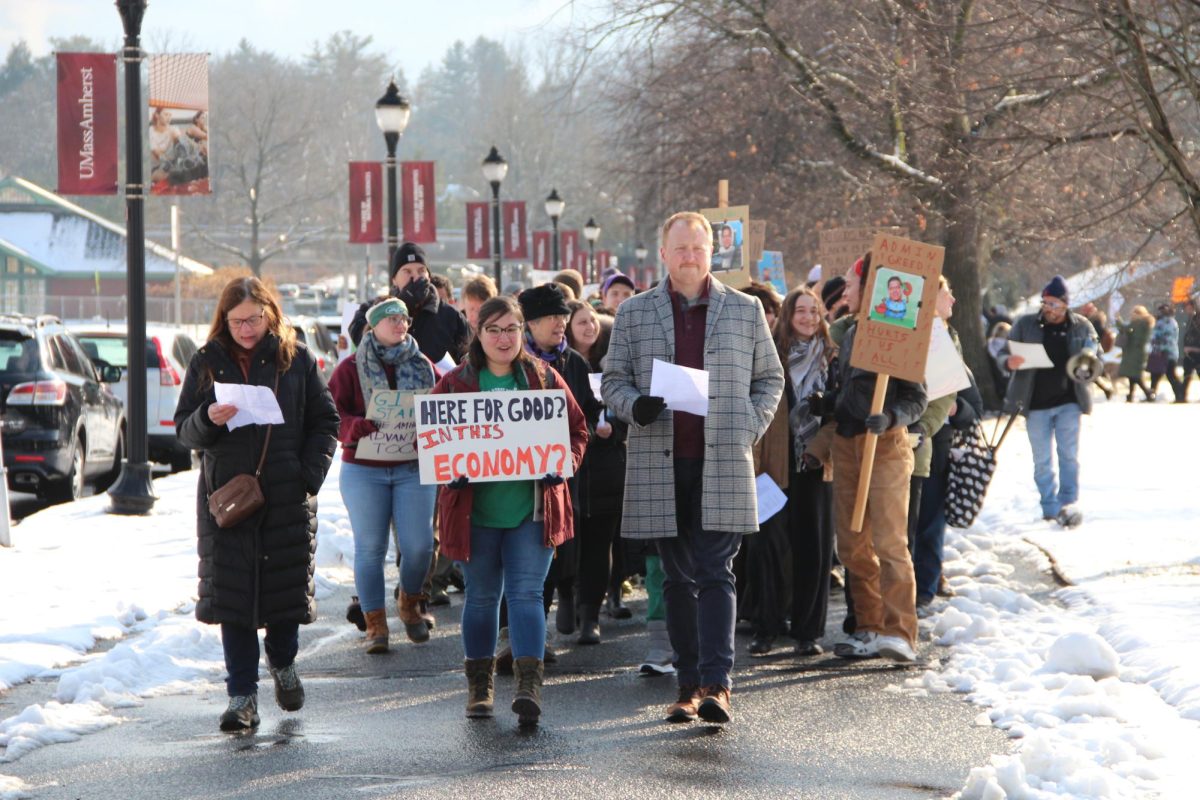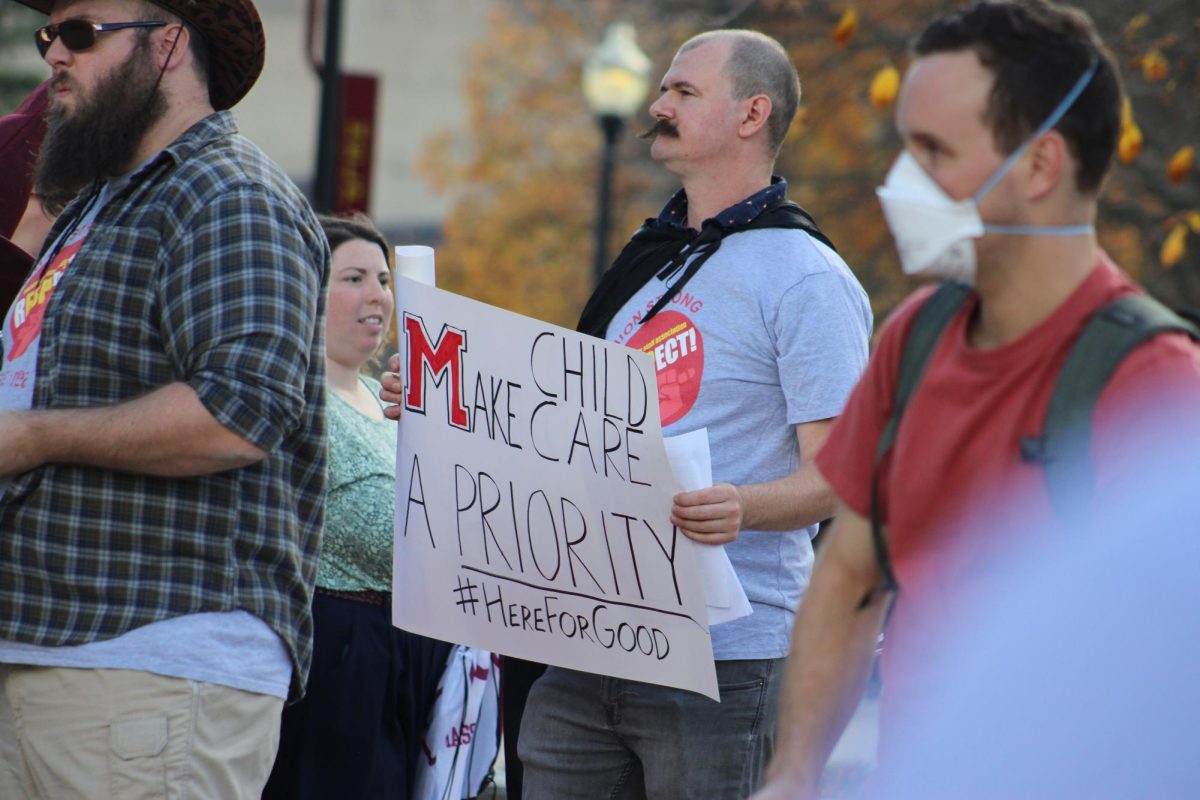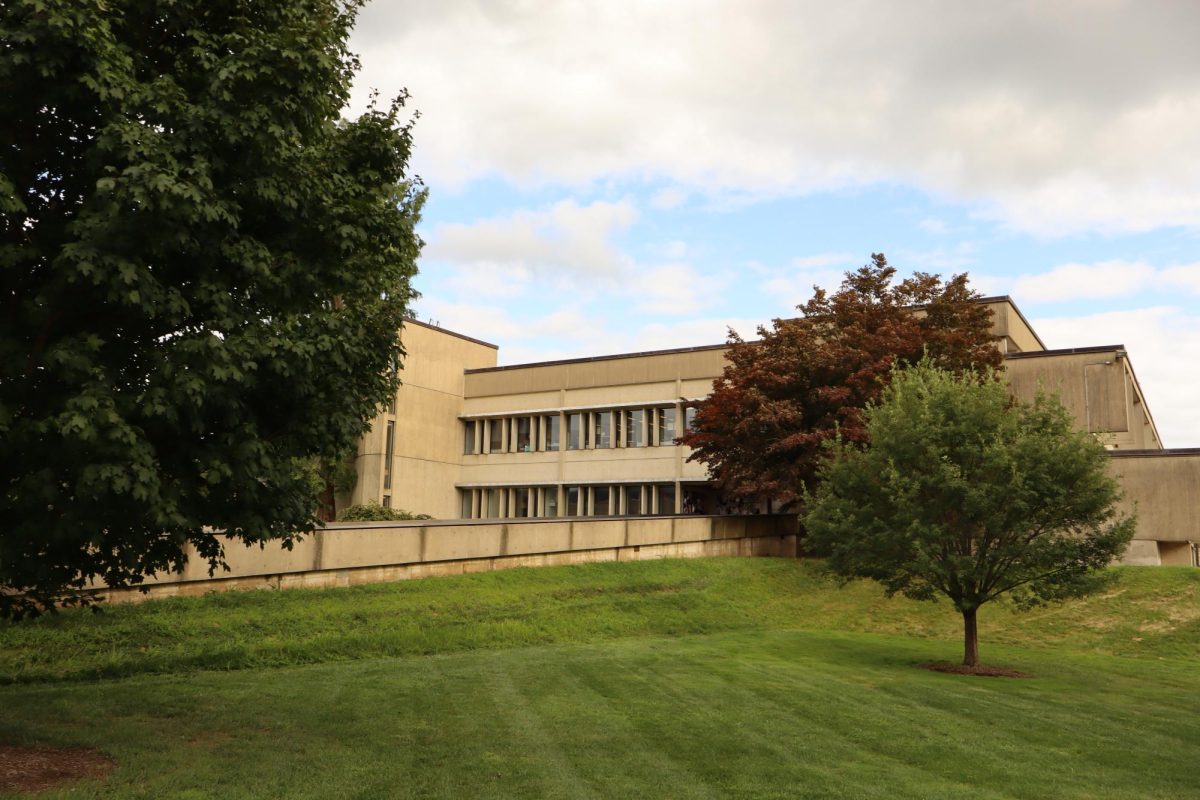On May 12, the Faculty Senate at the University of Massachusetts held a special meeting in Mahar auditorium to discuss “campus protests and administrative and policing responses” that occurred during an encampment in solidarity with Gaza on May 7.
As a result of the encampment, over 130 undergraduates, graduates, faculty and community members were arrested by Massachusetts State Police and the University of Massachusetts Police for being in violation of the Land Use Policy and trespassing. Arrested students alleged brutal force by officers and University departments, students organizations and local groups have condemned the large police presence.
The meeting began with an explanation of the meeting guidelines and a request from the announcers to halt all applause, cheers or “other emotional outbursts.”
“I would like to acknowledge that these past few weeks have been deeply challenging for all of us,” Reyes opened.
Commenting that the videos circulating of students and police interaction are “distressing,” he said, “I am deeply committed to [the] defense of free speech and assembly.” He added that the events of May 7 and 8 were “not about free speech,” but “about ensuring the safety of the entire campus,” which was met with laughter from the audience.
The Demonstration Response Safety Team (DRST), created in Feb. 2024, told demonstrators three times at the April 29 encampment that if they put down their tents there was no need for police. Reyes commented that they “dismantled the encampment peacefully” and continued to use the space for teachings and demonstrations that were “collaborative and amicable.”
Reyes recapped the events that occurred on the evening of May 7, saying that after the first warning from the DRST, demonstrators “disregarded these instructions and continued to construct.” He added that he had received a new set of demands, including financial divestment, and met with demonstrators, but said some of the demands were “not within my power as Chancellor.”
According to Reyes, police issued their last warning at 7:34 p.m., seven hours after the first DRST warning. Then, 134 arrests were made, approximately seventy of which were UMass Amherst students, six were faculty, and the rest were not affiliated with the University. He continued, “the first encampment ended peacefully and cooperatively,” and said, “something changed from one week to the other.”
Reyes clarified that the recent arrests resulted in “no criminal charges whatsoever” and said, “I sincerely hope these developments have presented significant progress,” and that the demands were an “overreach of my authority.”
According to Eastern Hampshire District Court documentation of arrested protester’s arraignments, individuals were criminally charged with trespassing, riot and failure to disperse.
According to Reyes, the first warning stated that tents and structures must be dismantled and the demonstrations could continue. UMass Police Department (UMPD) requested that all local agencies be on call if necessary, “the same way they were on call for the previous encampment,” Reyes added. “We hoped for a peaceful and collaborative outcome.”
“We have made tremendous progress and it may not have been visible to all of you and that’s something to work on,” Reyes said. “Advocacy has paid off, will pay off and continue to pay off,” he added.
Reyes expanded that students, faculty, staff and administration “have to work together to ensure this never happens again, which includes reviewing University policy and potentially including faculty and students in DRST.
Vice Chancellor for Student Affairs and Campus Life Shelly Perdomo-Ahmed spoke after Reyes. She stated that the DRST gives “ample warning to our students so that they themselves can make informed decisions.”
After Perdomo-Ahmed, two members of the DRST, Executive Director of Emergency Health and Services and Emergency Management Jeff Hescock and Senior Vice Provost and Dean of Undergraduate Education Farshid Hajir spoke about their involvement in University response to the ecampment and as members of the DRST.
Hescock explained that the DRST has been activated four times this semester, the first two times on March 7 and 14 at Whitmore outside the Chancellor’s suite, where they provided handouts and QR codes about different policies on campus. Hescock explained that on March 7, the “groups demonstrated peacefully,” but on March 14, students used amplified sound and bullhorns leading the DRST to issue a notice because the demonstrators were “disturbing the continuity of operations.”
On the morning of April 30, the encampment was not consistent with the land use policy, according to Hajir. However, the “student leaders were extremely cooperative with us” and found their interactions to be “very professional,” he said.
Hajir said after the meeting between encampment representatives and Reyes that “we were sent in one more time to read out the agreements that the Chancellor had come to and ask again to dismantle.” Hajir said the DRST was met with “a fair amount of rude comments made towards us” and that “it was not possible for anyone to hear the statement.” “I just want to add that the DRST was formed in February and we have examples of it working, and we have this one example that did not lead to a successful outcome.”
Chief of Police at UMPD Tyrone Parnham said that UMPD had “fluid plans for the worst case scenario” at both encampments. According to him, all UMPD officers were deployed and planned for “unknowns,” hoping for zero arrests.
Parnham said that UMPD tries, “to deescalate and try to use no force.” He added, “most arrests have zero force,” and “most arrests happened that night with zero force.”
The meeting then moved to questions submitted prior to the meeting from UMass community members. When fielded a question about negotiating the allowance of encampments to which Reyes responded, “when we were negotiating we told very clearly [that] we had to uphold our policies.” After this response, someone from the audience shouted, “that’s a non-answer.”
Another question was asked about the timeline of the determination to announce dispersal orders were made, as well as questions regarding the arrest and how law enforcement was told to deal with protestors. Parnham explained that “365 days a year” enforcement officers are encouraged not to use violence. These responses were then met with breakouts of coughing from the audience and a point of order was called.
In following questions, Reyes explained that the policies are “very clear,” and that when one goes into an office or classroom and disrupts, “that is civil disobedience.” He also disagreed that he didn’t satisfy demands during a negotiation meeting that was reported in the Amherst Indy. “I don’t have any unilateral power,” Reyes said.
There were questions regarding the timeline of the police presence as well. Parnham said that the Massachusetts State Police arrived on campus at 4 p.m. and was requested by him “as a contingency.”
“Those arrested, including people who are not in an encampment, were charged with trespassing. Who made the determination that their presence constituted trespassing and what time of the day was that determination made?” asked the moderator.
Parnham said that it was the police that made the decision. Although the Chancellor made the initial call, the dispersal orders were done by the police and not the University administration.
Regarding campus climate and learning reputation, questions arose regarding the Chancellor’s plan to “rebuild” a positive environment at the University.
“We have a shared governance on this campus and we have to have shared responsibility for those things,” Reyes said. “If we’re going to have an encampment [and] allow for policy violations …[that’s] one thing we need to have a conversation about as a campus,” he added.
As for the aftermath, including policy changes and increased policing, Parnham said they are being “very intentional.” They’ve implemented visible patrols, plainclothes officers in different locations and safety escorts. “Folks are not feeling safe,” Reyes said.
Questions were then fielded by members of the Faculty Senate. Lori Goldner, professor of physics, asked how the University plans on repairing “[this] violation of trust and harmony.” The Chancellor reiterated his earlier answer of forming a group of faculty, students and staff to discuss more.
A senator was concerned about how police presence “invites violence” and if the Chancellor had a statement prepared if a student was killed. Reyes responded “No.”
Another faculty member described numerous alleged situations of excessive force, including students reportedly being “roughly treated, knocked to the ground [and] kicked” by arresting officers. Parnham said he’s “not familiar with all of those situations that were just described” and that reports need to be made for him to follow up on them.
During the questioning, Parnham explained that the Mullins Center and university shuttle buses were repurposed for the arrests since UMPD does not have a large capacity.
Reyes explained that “there were a lot of conversations that happened” and alleged six hours of negotiations and messaging before the police were called. He said they talked to groups like the Foundation Board and worked with the conduct process prior to the arrests.
Brenda Bushouse, an associate professor of public policy, is also a mother of one of the arrested. “These mythical people who are coming to wage violence, I don’t know who you’re talking about. What I saw were really scared kids whose parents were not with them [at the arraignments]” she said.
“Why would they [the police] turn on the peaceful people behind them for chanting, [chasing them] with strobe lights and [causing] a stampede?” She also asked how the Chancellor’s actions will affect recruitment and if he considered the long term impact of getting donors for the University.
“We received letters and emails about people that are unhappy with this but we also receive letters and emails from people that are…there’s not just one side to this,” said the Chancellor.
Regarding more proactive work towards helping Gazan students and bringing them and other experts to the University, the Chancellor encouraged proposals to be submitted to the Community, Democracy and Dialogue (CDD) initiative.
Parnham does not have any financial figures yet regarding the cost of mobilizing both police forces, due to it being one week out since the arrests. “We will have those prices, we don’t have [them] right now,” he said.
Addressing the alleged use of riot gear, Parnham added that officers were wearing their regular uniforms but donned on protective helmets after finding a pile of rocks on the lawn and receiving notice of an individual being “hit in the head.”
A question also arose regarding the arrests that followed after the encampment was taken down and “what was accomplished by this [the arrests] and if the answer was no…why won’t you [the Chancellor] apologize?”
Parnham said the others were arrested for failure to disperse and trespassing. Reyes added, “I just thought that was the best for the campus to do what we did.”
Attendees were seen waving their hands in agreement with the senators when questions were asked.
Another senator said that the “big, large group did not assemble [because] of the protesters, they assembled because of the increasing presence of the armed police on our campus” to which Parnham responded saying it was “still very intense” following the takedown of the encampment with demonstrators allegedly following the police to their cars and being “inches away” from them. “These folks did not seem to be fearful of the armed police,” he said.
The meeting was adjourned and the gathering immediately broke into chants, saying “Free Free Palestine” and “Disclose, Divest, We will not stop, We will not rest.” A group followed the Chancellor out of the room and a rally of around 60 gathered outside the building, with one person putting up a tent right outside of the entrance.
Abby Joyce can be reached at [email protected]. Mahidhar Sai Lakkavaram can be reached at [email protected] and followed on X @Mahidhar_sl.





















